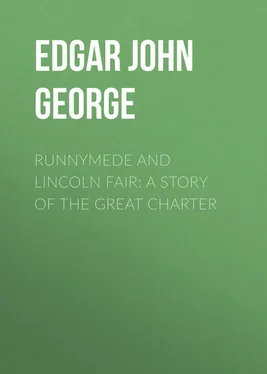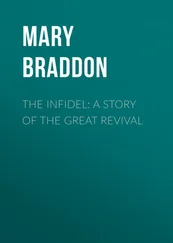John Edgar - Runnymede and Lincoln Fair - A Story of the Great Charter
Здесь есть возможность читать онлайн «John Edgar - Runnymede and Lincoln Fair - A Story of the Great Charter» — ознакомительный отрывок электронной книги совершенно бесплатно, а после прочтения отрывка купить полную версию. В некоторых случаях можно слушать аудио, скачать через торрент в формате fb2 и присутствует краткое содержание. Жанр: foreign_antique, foreign_prose, на английском языке. Описание произведения, (предисловие) а так же отзывы посетителей доступны на портале библиотеки ЛибКат.
- Название:Runnymede and Lincoln Fair: A Story of the Great Charter
- Автор:
- Жанр:
- Год:неизвестен
- ISBN:нет данных
- Рейтинг книги:3 / 5. Голосов: 1
-
Избранное:Добавить в избранное
- Отзывы:
-
Ваша оценка:
- 60
- 1
- 2
- 3
- 4
- 5
Runnymede and Lincoln Fair: A Story of the Great Charter: краткое содержание, описание и аннотация
Предлагаем к чтению аннотацию, описание, краткое содержание или предисловие (зависит от того, что написал сам автор книги «Runnymede and Lincoln Fair: A Story of the Great Charter»). Если вы не нашли необходимую информацию о книге — напишите в комментариях, мы постараемся отыскать её.
Runnymede and Lincoln Fair: A Story of the Great Charter — читать онлайн ознакомительный отрывок
Ниже представлен текст книги, разбитый по страницам. Система сохранения места последней прочитанной страницы, позволяет с удобством читать онлайн бесплатно книгу «Runnymede and Lincoln Fair: A Story of the Great Charter», без необходимости каждый раз заново искать на чём Вы остановились. Поставьте закладку, и сможете в любой момент перейти на страницу, на которой закончили чтение.
Интервал:
Закладка:
At length public affairs, which every day assumed a more menacing aspect, and everywhere excited the utmost interest and speculation, brought William Longsword, Earl of Salisbury, to the court; and Oliver Icingla, encouraged by the patronage of the great earl, who told him to “fear nothing, for no evil should befal him,” took heart, and learned to bear his lot with more patience. His position, however, was irksome; and, while all around were talking of the great events that were on the gale, and of the part which they expected to play therein, he durst not even calculate what the future might bring to him. Nevertheless he kept up his spirits, and indulged in the hope of fortune proving favourable; and he was coming to the conclusion that life in the Tower was not on the whole absolutely insupportable, when one morning, when winter had gone and spring had come, while walking in the gardens within the walls of the fortress he was met by Robert, Lord Neville, a young nobleman of great possessions in the North, and a strong adherent of the royal cause.
“Master Icingla,” said Neville, kindly, “I grieve to see that you are more gloomy in your present position than your friends could desire, and I would fain do something, if I could, to make your life more cheerful. Now the king is about to ride forth to recreate himself with such sport as can be got in the forest of Middlesex; and, if it would pleasure you to be of the company, I doubt not my power to take you as my comrade.”
“My lord,” replied Oliver, to whom the invitation was a very pleasant surprise, “I thank you with all my heart. Nothing, in truth, would please me better than to have my foot once more in the stirrup, and to taste the pure air of the forest on whose verge I was reared.”
Neville smiled, as if pleased with the gratitude which his offer had excited; and the young lord, whose pride was so proverbial that he was nicknamed “The peacock of the North,” so managed matters, that, when he mounted in the courtyard of the Tower, where huntsmen and hounds were ready to accompany King John to the chase, Oliver Icingla had the satisfaction of vaulting on his black steed, Ayoub, to ride by his side.
At the same time John came forth with a hawk on his wrist, and amidst much ceremony mounted a white palfrey magnificently caparisoned. The king wore a splendid dress, and over it a scarlet mantle fastened with gems; for, from Geoffrey of Anjou to Richard III., every Plantagenet, with the exception of the first Edward, had a weakness for magnificence in the way of raiment; and John, like his son Henry, had the reputation of being the greatest dandy in his dominions. But, in spite of his royal state and his gorgeous attire, the king had the look of a man whose mind was ill at ease. The thoughtful German has said that the past or the future is written on every man’s countenance; and perhaps, as John that day rode away from the Tower, and through the narrow streets of London, and out of the gate that led to the great forest, tenanted by deer and haunted by the bear, and the boar, and the wild bull, an acute observer might have read on his face, as in a book, signs of the working of a mind clouded with presentiments of the fate which, in spite of all his efforts and all his stratagems, was one day to overwhelm him in gloom and humiliation. But, if so, the melancholy was not contagious; and Lord Neville, at least, was gay as the lark at morn.
“Now, Master Icingla,” said the young noble, turning to his companion as they entered the forest, “you feel the better for this change of scene, and begin to think, after all, that life is life, and has its sweets?”
“On my faith, my lord, I do,” replied Oliver, with frank sincerity, “and beshrew me if I know how sufficiently to express my thanks to you, to whom I am indebted for a change so grateful to the heart and refreshing to the spirits.”
“Nay, no thanks,” said Neville, whose pride was great, but whose frankness was fully equal to his pride. “I am right well pleased to be of any service to you, and should look for as much at your hands were our positions reversed. I repeat,” continued he, more earnestly, “that I cannot but grieve to see you so gloomy, after what my Lord of Salisbury said of your deservings, and I sympathise in some measure with your melancholy; for I, like yourself, albeit bearing the surname of my Norman grandmother, am genuine English in the male line. But, after all, your captivity, if captivity it can be called, is by no means severe, or such as ought to break the spirit; not to mention that, like everything in this world, it will come to an end. In truth,” added the young lord, half laughing, “your kinsman, Hugh de Moreville, would seem to concern himself little how it ends with you, since it is rumoured – and I believe truly – that he has, under pretext of visiting the Castle of Mount Moreville, on the north of the Tweed, gone to the Scottish court at Scone, to tempt or bribe or bully Alexander, the young King of Scots, into an alliance with the confederate barons. So much for his good faith, for which you are a hostage!”
“Well, my lord,” replied Oliver, not without a change of colour and a thrill of blood to his heart, “I never flattered myself with the notion that De Moreville would have any scruples about sacrificing me if I stood in the way of his own interests. However, my kinsman may even do his worst, since fate has brought me to this pass. A man can die but once, and the time is in the will of God. Had I, indeed, my own will, my death should neither take place in a dungeon nor on the gallows-tree, but on field of fight.”
“Master Icingla,” said Neville, smiling kindly as he spoke, “take comfort, and be guided by me. You will doubtless live to see, and survive, many foughten fields if you are discreet. But a truce to this talk for the nonce, for I perceive by the movements of the huntsmen that the dogs have scented game.”
And Neville’s instincts did not deceive him. Almost as he spoke, a buck, breaking from the thicket, dashed nimbly up a glade of the forest, closely pursued by the hounds, and instantly the attention of the king and his company was concentrated in the exciting chase. It was not of long duration, however; and ere noon the buck was pulled down by the hounds, and cut up with all the forms customary on such occasions, the king and his courtiers standing round, and the horses breathing after their hard run.
“A fat buck, by my Halidame!” exclaimed the Lord Neville.
“Ay, a fat buck, if ever there was one,” responded King John. “You see,” added he, merrily, as he glanced round the circle – “you see how this buck has prospered, and yet I’ll warrant he never heard a mass.”
Now, ever since the time when John quarrelled with the Pope and sent ambassadors to the Moorish King of Granada, his respect for the faith of his fathers had been gravely doubted; and this speech, even if nothing were meant, was imprudent under the circumstances, and shocked the religious sentiments of many present. Some of the courtiers, indeed, accustomed to smile at every merry speech of their sovereign, smiled on this occasion also. But the majority looked serious, and Lord Neville, whose countenance became not only serious but sad, turned to Oliver Icingla.
“Far from discreet it is of our lord the king to speak in this fashion,” whispered he, “and enough, in the opinion of many, to bring a malison on the royal cause, which, certes, at this crisis needs all the aid which the saints are like to render it.”
Oliver bowed his head, as if in assent, but remained silent. Perhaps he did not think that a hostage was in duty bound to utter any criticisms on the expressions of a man in whose power he was; and the hunters turned their horses’ heads, and rode up the forest in the direction of London.
Читать дальшеИнтервал:
Закладка:
Похожие книги на «Runnymede and Lincoln Fair: A Story of the Great Charter»
Представляем Вашему вниманию похожие книги на «Runnymede and Lincoln Fair: A Story of the Great Charter» списком для выбора. Мы отобрали схожую по названию и смыслу литературу в надежде предоставить читателям больше вариантов отыскать новые, интересные, ещё непрочитанные произведения.
Обсуждение, отзывы о книге «Runnymede and Lincoln Fair: A Story of the Great Charter» и просто собственные мнения читателей. Оставьте ваши комментарии, напишите, что Вы думаете о произведении, его смысле или главных героях. Укажите что конкретно понравилось, а что нет, и почему Вы так считаете.












